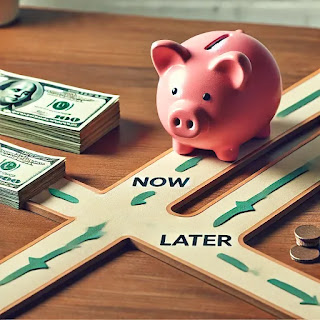Self-Control and Commitment
- Get link
- X
- Other Apps
We often hear we lack self-control, but do we truly grasp its meaning? Let's break it down, exploring the perspective of the father of behavioural economics: Howard Rachlin.
Intertemporal choices, the decisions we make that involve trading off immediate pleasures for delayed benefits, are often narrated through tales like this: "Faced with the decision of another cigarette, or another Cuba Libre, individuals weigh these choices against the promise of a healthier life." This narrative frames decisions as a trade-off between two positive outcomes -an immediate pleasure and the allure of a better future. However, Howard Rachlin challenged this binary view, suggesting that individuals might interpret the dilemma as a choice between an immediate good (smoking now) and a delayed bad (emphysema).
Consider the term "healthier" as vague and abstract. Rachlin's major contribution lies in reframing this narrative. People often give up cigarettes not solely for a "healthier life" but out of the fear of lung cancer -a concrete, delayed negative. This shift from an abstract, delayed positive to a concrete, delayed negative was a game-changer, and it's where Rachlin's transformative work comes into play
Rachlin reconceptualised our understanding of self-control, recognising that real-world choices are far more complex than the binary options often presented in studies. It's not solely the choice of whether or not to smoke a cigarette in a given moment that holds significance. Rather, it's the pattern of choices over time that truly matters -a patterns influenced by the interplay of immediate pleasure's and delayed consequences.
In this dynamic landscape of intertemporal choices, Howard Rachlin introduced commitment strategies. A commitment response involves early actions to eliminate or diminish the allure of upcoming temptations. For instance, making a verbal commitment, like saying 'I will not smoke,' reduces the immediate pleasure's allure, reflecting on one's commitment to others.
The use of behavioural contracts can be a powerful tool too. A prime example is the commitment device utilised in smoking cessation programmes. Those seeking to quit voluntarily enter a behavioural contract with a health agency, pledging to refrain from smoking to achieve specific milestones. This formalised agreement provides a structured framework, reinforcing individuals' resolve to resist temptations and contributing to positive outcomes in smoking cessation.
Rachlin deserves more recognition and should be acknowledged as a pioneer of behavioural economics. For a deeper dive into understanding decision-making, exploring Rachlin's work is a must.
- Get link
- X
- Other Apps




Comments
Post a Comment